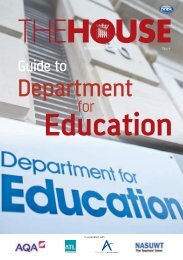Oracy
2fcBkno
2fcBkno
Create successful ePaper yourself
Turn your PDF publications into a flip-book with our unique Google optimized e-Paper software.
Whole-school practices<br />
Schools do not consistently provide meaningful opportunities for pupils to develop oracy outside<br />
the classroom. Apart from inviting pupils to speak or present as part of assemblies, only a small<br />
proportion of schools engage in practices such as reviewing the quality of teachers’ and pupils’ verbal<br />
contributions during lesson observations, or communicating with parents about their children’s spoken<br />
communication in school. xxix Whole school approaches to oracy are particularly rare in FE colleges. The<br />
relative paucity of whole-school practices is surprising given teachers’ overwhelming recognition of<br />
oracy’s importance.<br />
What strategies does your school use to support oracy? 906<br />
Invites pupils to speak or present as part of its assemblies<br />
54%<br />
Reviews or evaluates the quality of pupils’ verbal contributions as part<br />
of formal lesson observations<br />
27%<br />
Has a debating club<br />
25%<br />
Formally communicates with parents about the quality of pupils’ verbal<br />
contributions in lessons<br />
20%<br />
None of these<br />
18%<br />
Has a policy for ‘oracy’, ‘spoken language’, ‘oral communication’, etc.<br />
16%<br />
Collects assessment or tracking data about pupils’ oracy (beyond that<br />
which is required for GCSE spoken language<br />
Supports the use of oracy-related activities organised by external<br />
organisations (ESU, LAMBDA etc.)<br />
9%<br />
12%<br />
Holds ‘no pens’ days or other one-off days focused on oracy<br />
8%<br />
Don’t know<br />
6%<br />
Has a discrete curriculum for oracy<br />
6%<br />
Teachers from independent (46%) and<br />
grammar schools xxx (69%) highlight<br />
they are more likely than those in<br />
local authority schools or academies<br />
to have debating clubs. Such clubs<br />
are more common in secondary<br />
schools (38%) than primary schools<br />
(8%). Independent schools are also<br />
significantly more likely than state<br />
schools to use external organisations<br />
such as the English Speaking Union<br />
(ESU) or London Academy of Music<br />
and Dramatic Art (LAMDA) to deliver<br />
some form of oracy-based activity,<br />
and to communicate formally with<br />
parents about the quality of pupils’<br />
contributions in lessons perhaps,<br />
suggesting that independent schools<br />
place greater emphasis on pupils’<br />
ability to publicly express their<br />
ideas and opinions.<br />
0% 20%<br />
40% 60%<br />
Formal assessment of oracy is unusual and in interviews<br />
teachers tend to describe their colleagues as sceptical<br />
about both the possibility and desirability of assessing oracy<br />
formally. This does not mean schools do not communicate<br />
about oracy, particularly at primary and Early Years level,<br />
where 30% and 38% of respondents respectively say they<br />
formally communicated with parents about pupils’ verbal<br />
contributions in lessons. On the other hand, such practices<br />
are far less common in secondary schools.<br />
Interviewees feel some ‘school-level’ strategies do not build<br />
on or relate to the activities taking place in lessons, either<br />
directly or indirectly. Furthermore, a number of interviewees<br />
in different phases and school types feel strongly that<br />
school-level strategies set the tone for a school’s culture<br />
and ethos, but feel some schools miss out on opportunities<br />
to bring pupils and staff together through these more highprofile<br />
public activities. Such schools are potentially missing<br />
out on ‘easy wins’ to raise the profile and status of oracy,<br />
and providing pupils with novel opportunities to develop<br />
their skills as public speakers.<br />
xxix<br />
Practitioners were asked about their school’s practices, with oracy defined as ‘the development of children’s capacity to use speech to<br />
express their thoughts and communicate with others in education and in life, and talk through which teaching and learning is mediated’<br />
(based on Alexander, 2012: 10).<br />
xxx<br />
The base sizes are below 50 for grammar schools (n=29). Reference to results in relation to grammar schools should therefore be<br />
regarded as illustrative rather than representative.<br />
49




